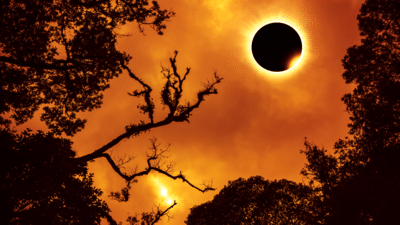
A solar eclipse is one of the most mesmerizing celestial events, captivating people worldwide with its breathtaking display. While it is a rare and stunning astronomical phenomenon, many cultures and scientific studies have associated it with potential health effects. With a major solar eclipse set to occur in 2025 , it is essential to understand its impact on human health and well-being.
Key Details of the Solar Eclipse 2025
The next significant solar eclipse is expected to occur on March 29 , 2025. This eclipse will be a partial eclipse in many regions, while some areas may witness a total solar eclipse. Countries in North America, Europe, and parts of Asia will have the best views of the celestial event.
Solar eclipses occur when the Moon moves between the Sun and Earth, partially or entirely blocking the Sun’s light. While these events have fascinated astronomers for centuries, they have also raised health-related concerns due to their effect on the environment and human physiology.
How Solar Eclipses Impact Health
Although solar eclipses do not directly harm human health, several myths, scientific theories, and anecdotal experiences suggest that they may influence our well-being in various ways. Let’s explore some key aspects of health that could be affected during and after the 2025 solar eclipse.
1. Eye Health Risks
One of the most well-documented risks associated with solar eclipses is the potential damage to eye health. Looking directly at the Sun during an eclipse without proper protection can cause permanent retinal damage, leading to a condition called solar retinopathy. Symptoms include blurred vision, dark spots, and even permanent blindness.
How to Protect Your Eyes:
Use certified solar eclipse glasses with ISO-approved filters.
Avoid looking at the Sun through regular sunglasses, camera lenses, or telescopes without solar filters.
Utilize pinhole projectors to safely observe the eclipse indirectly.
See more:
Solar Eclipse 2025: 5 things to do before, during, and after solar eclipse
2. Psychological and Emotional Impact
Solar eclipses have been linked to psychological changes, often inducing anxiety, restlessness, and mood swings in some individuals. The sudden change in daylight can disrupt the body's circadian rhythm, which regulates sleep and mood.
Tips to Maintain Emotional Balance:
Engage in relaxation techniques like meditation and deep breathing.
Stay indoors if you feel overwhelmed by the phenomenon.
Maintain a positive mindset and avoid superstitions that may trigger anxiety.
3. Sleep Disruptions and Fatigue
Eclipses can alter the amount of sunlight exposure we receive, which in turn affects our body’s natural sleep-wake cycle. Some people report disturbed sleep patterns, excessive drowsiness, or headaches during and after an eclipse.
How to Improve Sleep During an Eclipse:
Stick to a consistent bedtime routine.
Avoid caffeine and heavy meals before bedtime.
Spend time in natural light during the day to regulate melatonin production.
4. Impact on Pregnant Women
In many cultures, solar eclipses are believed to be harmful to pregnant women and unborn babies. While scientific evidence on this matter is limited, traditional beliefs suggest that pregnant women should avoid going outdoors during an eclipse to prevent potential complications.
Precautions for Expecting Mothers:
Stay indoors during the eclipse.
Avoid looking directly at the Sun.
Follow a balanced diet and stay hydrated to maintain overall well-being.
5. Effects on Digestion and Metabolism
There is a belief in Ayurveda and traditional medicine that food digested during a solar eclipse may produce toxins in the body. While scientific evidence does not fully support this, some people experience loss of appetite, nausea, or digestive discomfort around the time of an eclipse.
How to Maintain Digestive Health:
Eat light meals before and after the eclipse.
Drink plenty of water to stay hydrated.
Avoid consuming raw or heavy foods if you are sensitive to changes in your digestive system.
Scientific and Cultural Perspectives on Solar Eclipses
Scientific Views
From a scientific standpoint, solar eclipses primarily affect light exposure and temperature fluctuations rather than directly influencing human health. However, changes in natural light can disrupt hormonal balance, particularly the production of melatonin, which regulates sleep.
Cultural and Mythological Beliefs
Many ancient civilizations considered solar eclipses to be omens of doom or transformation. In Hindu mythology, it is believed that an eclipse occurs when the demon Rahu swallows the Sun, while in some Native American traditions, eclipses signify renewal and change.
People across various cultures follow specific rituals, such as taking a bath after the eclipse, avoiding food during the event, and chanting prayers to ward off negative energy. While these beliefs lack scientific backing, they hold significant cultural importance for many individuals.
Precautions to Take During the Solar Eclipse 2025
To ensure safety and well-being during the upcoming solar eclipse, follow these simple precautions:
✔ Wear protective glasses: Use NASA-approved solar viewing glasses to safely observe the eclipse.
✔ Stay indoors if sensitive: Those prone to anxiety, sleep disturbances, or emotional distress should remain indoors.
✔ Protect pregnant women and children: While no scientific evidence supports harm, traditional beliefs suggest extra precautions for these groups.
✔ Maintain a healthy routine: Get enough rest, drink plenty of water, and eat nutritious foods to counteract any potential effects.
✔ Engage in meditation and relaxation: Reduce stress by practicing mindfulness activities during the event.
Final Thoughts
The solar eclipse of 2025 is a fascinating celestial event that offers a rare opportunity to witness the wonders of space. While myths and beliefs about its health effects persist, it is essential to distinguish scientific facts from superstitions. The best approach is to take necessary precautions, protect your eyesight, and maintain a balanced lifestyle to experience the eclipse safely.
Whether you choose to observe the eclipse with awe or remain indoors, understanding its potential health impacts can help you make informed decisions. With proper care and awareness, you can enjoy this extraordinary event while safeguarding your well-being.
